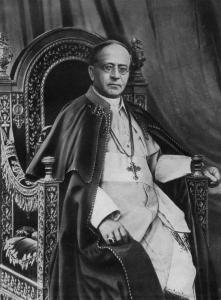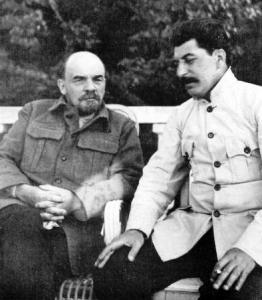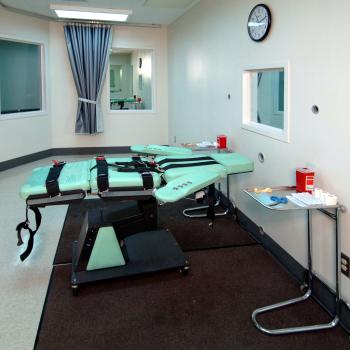When Pope Pius XI wrote his encyclical Quadragesimo anno [1] in 1931, forty years after the publication of Rerum novarum, the Socialism confronted by Pope Leo XIII in the late 19th century had split into two sections. One section was Communism, which Pope Pius XI described this way:
“Communism teaches and seeks two objectives: Unrelenting class warfare and absolute extermination of private ownership. Not secretly or by hidden methods does it do this, but publicly, openly, and by employing every and all means, even the most violent. To achieve these objectives there is nothing which it does not dare, nothing for which it has respect or reverence; and when it has come to power, it is incredible and portentlike in its cruelty and inhumanity. The horrible slaughter and destruction through which it has laid waste vast regions of eastern Europe and Asia are the evidence; how much an enemy and how openly hostile it is to Holy Church and to God Himself is, alas, too well proved by facts and fully known to all.”
 There should be no need to catalogue the atrocities committed under Communist regimes, such as the killing fields of Cambodia, the Great Leap Forward in China, the Great Purge under Stalin, and the concentration camps of North Korea. And let not aspiring Communists flatter themselves that these things didn’t arise out of the very nature of Marxism itself. Writing of the measures to be taken by the proletariat after it seized power, Karl Marx and Friedrich Engels wrote in the The Communist Manifesto,
There should be no need to catalogue the atrocities committed under Communist regimes, such as the killing fields of Cambodia, the Great Leap Forward in China, the Great Purge under Stalin, and the concentration camps of North Korea. And let not aspiring Communists flatter themselves that these things didn’t arise out of the very nature of Marxism itself. Writing of the measures to be taken by the proletariat after it seized power, Karl Marx and Friedrich Engels wrote in the The Communist Manifesto,
“Of course, in the beginning, this cannot be effected except by means of despotic inroads on the rights of property, and on the conditions of bourgeois production; by means of measures, therefore, which appear economically insufficient and untenable, but which, in the course of the movement, outstrip themselves, necessitate further inroads upon the old social order, and are unavoidable as a means of entirely revolutionising the mode of production.” [2]
Thus Marx and Engels themselves recognized that a prodigious amount of force would have to be brought to bear to realize their plan. Moreover, while some of their proposals, such as the abolition of child labor, were salutary, they also hoped to establish an equal “liability of all to labour,” and the establishment “of industrial armies, especially for agriculture.” In other words, they envisioned the realization of their system through forced labor. They also sought “a more equable distribution of the population over the country.” That is, forced relocation.
 The problem with endless class war is that it never ends. Even if every capitalist is exterminated, the movement that engendered the war will turn and devour itself. And Communism is a precise plan of action that can by no means give space to alternative approaches, which is why it doesn’t. One thing that can be said for sure is that it is not Christianity.
The problem with endless class war is that it never ends. Even if every capitalist is exterminated, the movement that engendered the war will turn and devour itself. And Communism is a precise plan of action that can by no means give space to alternative approaches, which is why it doesn’t. One thing that can be said for sure is that it is not Christianity.
It is astonishing to think that sincerely well-meaning people still advocate Marxism. However well-reasoned Marx’s critique of Capitalism was, his remedy proved to be an atrocity. Pope Pius XI saw this clearly, and now we have the advantage of eighty-seven more years of hindsight. And even some present sight. No Catholic should be an advocate for Communism.
In the next installment: the other section that Socialism had split into in Pope Pius XI’s day.
The icon of St. Joseph the Worker is by Daniel Nichols.
Listen to Christian Democracy on live internet radio on Tuesdays at 10:30 p.m. Eastern time at WCAT Radio here, or listen to the podcast here on the Christian Democracy Patheos blog.
Please go like Christian Democracy on Facebook here. Join the discussion on Catholic social teaching here.












